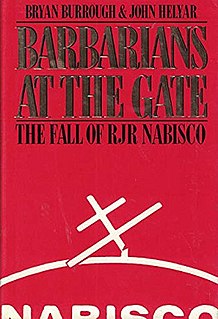 W
WBarbarians at the Gate: The Fall of RJR Nabisco is a 1989 book about the leveraged buyout (LBO) of RJR Nabisco, written by investigative journalists Bryan Burrough and John Helyar. The book is based upon a series of articles written by the authors for The Wall Street Journal. The book was later made into a made-for-TV movie by HBO, also called Barbarians at the Gate. The book centers on F. Ross Johnson, the CEO of RJR Nabisco, who planned to buy out the rest of the Nabisco shareholders.
 W
WThe Big Short: Inside the Doomsday Machine is a non-fiction book by Michael Lewis about the build-up of the United States housing bubble during the 2000s. The book was released on March 15, 2010, by W. W. Norton & Company. It spent 28 weeks on The New York Times best-seller list, and was the basis for the 2015 film of the same name.
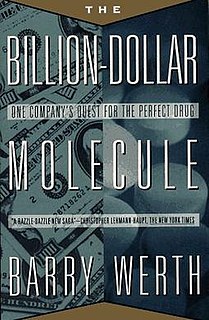 W
WThe Billion-Dollar Molecule is a book by journalist Barry Werth about the founding and early research efforts of the American biotechnology company Vertex Pharmaceuticals, which was founded in 1989 by Joshua Boger and was among the first biotechnology companies to adopt an explicit strategy of rational drug design as opposed to techniques based on combinatorial chemistry.
 W
WBlackwater: The Rise of the World's Most Powerful Mercenary Army is a book written by independent journalist Jeremy Scahill, published by Nation Books in 2007, as a history and analysis of Blackwater USA, now called Academi. It won one of the 2007 George Polk Awards.
 W
WBlue Blood and Mutiny: The Fight for the Soul of Morgan Stanley is a non-fiction book by American journalist and historian Patricia Beard. The book was initially published by William Morrow on September 18, 2007.
 W
WThe Death of Holden: The End of an Australian Dream is a 2016 book by Royce Kurmelovs.
 W
WThe Descent of Air India is a book by Jitender Bhargava, a former executive director of Air India. The book chronicles the financial downfall of the public sector airline. The book was withdrawn after a defamation suit was filed by former Aviation Minister Praful Patel. The book is now available as an ebook on Amazon Kindle Store. Hard copies are also available on Amazon India since January 2016 after the author self-published the book.
 W
WECONned: How Unenlightened Self Interest Undermined Democracy and Corrupted Capitalism is a 2010 non-fiction book by Yves Smith, author of the Naked Capitalism blog. The book describes how the deregulation of the financial industry and the systemic incentives for managers to "loot" limited liability companies led to the build-up and eventual collapse of the credit bubble during the 2000s. Smith argues that free market economists hold much of the blame for the 2008 financial crisis due to their outsized influence over policy makers. In particular, she takes issue with faux empirical approaches used by economists and the masking of complex social phenomenon in simple mathematical equations, based on assumptions that are openly acknowledged to be wrong or in error. The book makes the case that overreliance on the assumption of a 'self-correcting' free market led to a period of unregulated speculation, accounting tricks, and public looting.
 W
WThe Emperors of Chocolate: Inside the Secret World of Hershey and Mars is a book by Joël Glenn Brenner published on December 22, 1998 by Random House, Inc.. The book chronicles the stories of the history of Mars, Incorporated and The Hershey Company.
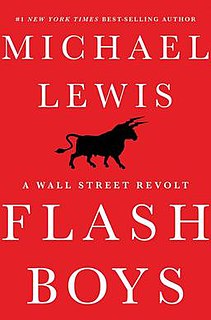 W
WFlash Boys: A Wall Street Revolt is a book by the American writer Michael Lewis, published by W. W. Norton & Company on March 31, 2014. The book is a non-fiction investigation into the phenomenon of high-frequency trading (HFT) in the US financial market, with the author interviewing and collecting the experiences of several individuals working on Wall Street. Lewis concludes that HFT is used as a method to front run orders placed by investors. He goes further to suggest that broad technological changes and unethical trading practices have transformed the U.S. stock market from "the world's most public, most democratic, financial market" into a "rigged" market.
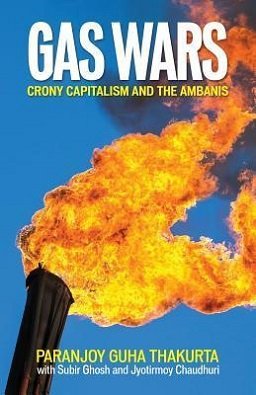 W
WGas Wars: Crony Capitalism and the Ambanis is a book written by Paranjoy Guha Thakurta, Subir Ghosh and Jyotirmoy Chaudhuri. The book was officially released on 15 April 2014. The book deals with the issue of irregularities in the determination of the price of natural gas in India.
 W
WThe Great Game: The Emergence of Wall Street as a World Power: 1653–2000 is a non-fiction book on business history by John Steele Gordon. The book was initially published on November 16, 1999 by Scribner.
 W
WThe Greatest Trade Ever: The Behind-the-Scenes Story of How John Paulson Defied Wall Street and Made Financial History is a debut non-fiction book by American journalist Gregory Zuckerman. The book was released on November 3, 2009 by Crown Business. The book investigates the reasons and consequences of the subprime mortgage crisis and the role that hedge fund manager John Paulson played in those events.
 W
WThe Grey Seas Under is a non-fiction book by Canadian author Farley Mowat about the Atlantic Salvage Tug Foundation Franklin, operated by the firm Foundation Maritime in Canada's Maritime provinces from 1930 to 1948.
 W
WGrit, Guts and Gumption: Driving Change in a State-Owned Giant is a book by Rajesh Chakrabarti, Professor of Finance at Indian School of Business, Hyderabad. The book was published in November 2010 by Viking Press. The foreword of the book was written by Rajat Gupta, former managing director of McKinsey & Company and co-founder of Indian School of Business.
 W
WThe History of the Standard Oil Company is a 1904 book by journalist Ida Tarbell. It is an exposé about the Standard Oil Company, run at the time by oil tycoon John D. Rockefeller, the richest figure in American history. Originally serialized in nineteen parts in McClure's magazine, the book is a seminal example of muckraking, and inspired many other journalists to write about trusts, large businesses that attempted to gain monopolies in various industries.
 W
WHouse of Cards: A Tale of Hubris and Wretched Excess on Wall Street is the second book written by William D. Cohan. It was released on March 10, 2009 by Doubleday.
 W
WI'm Feeling Lucky: The Confessions of Google Employee Number 59 is a 2011 book by Douglas Edwards, who was Google's first director of marketing and brand management. The book tells his story of what it was to be on the inside during the rise of one of the most powerful internet companies from its start-up beginnings.
 W
WIBM and the Holocaust: The Strategic Alliance between Nazi Germany and America's Most Powerful Corporation is a book by investigative journalist Edwin Black which details the business dealings of the American-based multinational corporation International Business Machines (IBM) and its German and other European subsidiaries with the government of Adolf Hitler during the 1930s and the years of World War II. In the book, published in 2001, Black outlined the way in which IBM's technology helped facilitate Nazi genocide through generation and tabulation of punch cards based upon national census data.
 W
WThe Informant is a nonfiction white-collar crime book written by journalist Kurt Eichenwald and published in 2000 by Random House. It documents the mid-1990s lysine price-fixing conspiracy case and the involvement of Archer Daniels Midland executive Mark Whitacre, inspiring a film adaptation starring Matt Damon as Whitacre.
 W
WThe ITT Wars: An Insider's View of Hostile Takeovers is a non-fiction book about ITT Corporation written by its CEO Rand Araskog. The book was published by Henry Holt & Co. in 1989.
 W
WITT: The Management of Opportunity is a non-fiction book about ITT Corporation by American business writer and historian Robert Sobel. The book was initially published by Times Books in 1982.
 W
WThe Last Tycoons: The Secret History of Lazard Frères & Co. is the debut book by William D. Cohan. It was released on April 3, 2007 by Doubleday. It focuses on the history of the prominent investment bank Lazard Frères. The book won the 2007 Financial Times and Goldman Sachs Business Book of the Year Award.
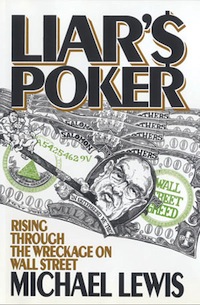 W
WLiar's Poker is a non-fiction, semi-autobiographical book by Michael Lewis describing the author's experiences as a bond salesman on Wall Street during the late 1980s. First published in 1989, it is considered one of the books that defined Wall Street during the 1980s, along with Bryan Burrough and John Helyar's Barbarians at the Gate: The Fall of RJR Nabisco, and the fictional The Bonfire of the Vanities by Tom Wolfe. The book captures an important period in the history of Wall Street. Two important figures in that history feature prominently in the text, the head of Salomon Brothers' mortgage department Lewis Ranieri and the firm's CEO John Gutfreund.
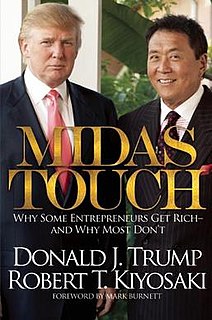 W
WMidas Touch: Why Some Entrepreneurs Get Rich — And Why Most Don't is a non-fiction book about personal finance, co-authored by Donald Trump and Robert Kiyosaki. The book was published in hardcover format in 2011. The coauthors became familiar with each other through mutual work at The Learning Annex, and The Art of the Deal. Trump was impressed by Kiyosaki's writing success with Rich Dad Poor Dad. The coauthors then wrote Why We Want You to be Rich together in 2006, and followed it up with Midas Touch in 2011.
 W
WMoney and Power: How Goldman Sachs Came to Rule the World is the third book written by William D. Cohan. It chronicles the history of Goldman Sachs, from its founding to the subprime mortgage crisis of 2008. First published as hardcover on March 29, 2011, the book has been reprinted soon thereafter on April 12, 2011 by Doubleday again. The text has been reprinted as paperback on January 10, 2012 by Penguin Books.
 W
WOne Click: Jeff Bezos and the Rise of Amazon.com is a book by Richard L. Brandt. It profiles the influential role of Amazon CEO and founder, Jeff Bezos, in the company's historic rise from start-up to the market leader of ecommerce.
 W
WThe Power of Habit: Why We Do What We Do in Life and Business is a book by Charles Duhigg, a New York Times reporter, published in February 2012 by Random House. It explores the science behind habit creation and reformation. The book reached the best seller list for The New York Times, Amazon.com, and USA Today. It was long listed for the Financial Times and McKinsey Business Book of the Year Award in 2012.
 W
WThe Predators' Ball: The Inside Story of Drexel Burnham and the Rise of the Junk Bond Raiders, by Wall Street Journal writer Connie Bruck, largely recounts the rise of Michael Milken, his firm Drexel Burnham Lambert, and the leveraged buyout boom they helped to fuel in the 1980s.
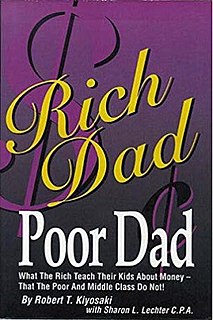 W
WRich Dad Poor Dad is a 1997 book written by Robert Kiyosaki and Sharon Lechter. It advocates the importance of financial literacy, financial independence and building wealth through investing in assets, real estate investing, starting and owning businesses, as well as increasing one's financial intelligence.
 W
WThe Second Bounce of the Ball: Turning Risk into Opportunity is a non-fiction book about entrepreneurship, written by Sir Ronald Cohen and first published in 2007 by Weidenfeld & Nicolson, London. The book discusses what it takes to become a successful entrepreneur, and contains biographical anecdotes from the author and the company he founded, Apax Partners. The book’s title comes from Cohen’s incorrect belief that the second bounce of a ball is difficult to predict.
 W
WThe Sovereign State is a non-fiction book by Anthony Sampson published on July 1, 1973 by Hodder & Stoughton Ltd. The book focuses on the history of ITT Corporation to make a broader point about the weakening of the authority of traditional national governments by the multinational corporations.
 W
WSue the Messenger: How legal arm-twisting by corporates is shackling reportage and undermining democracy in India is a book written by Subir Ghosh, with Paranjoy Guha Thakurta. The book was released at a gathering in New Delhi on 4 May 2016.
 W
WThink Big and Kick Ass: In Business and in Life is a non-fiction book by Donald Trump, first published in hardcover in 2007 by HarperCollins. The book was coauthored by The Learning Annex entrepreneur Bill Zanker. Another edition was subsequently published in paperback in 2008 under the title Think Big: Make It Happen in Business and Life. Trump and Zanker had prior business ventures together before writing the book; Zanker's company helped gain Trump speaking engagements around the world with large audiences.
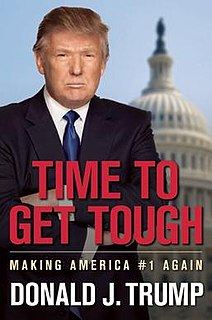 W
WTime to Get Tough: Making America #1 Again is a non-fiction book by Donald Trump. It was first published in hardcover format by Regnery Publishing in 2011. It was reissued under the new title Time to Get Tough: Make America Great Again! by the same publisher in 2015, to match Trump's 2016 election campaign slogan. Trump had previously published The America We Deserve (2000) as preparation for his attempt to run in the 2000 U.S. presidential campaign with a populist platform. Time to Get Tough in contrast served as his prelude to the 2012 U.S. presidential campaign, with a conservative platform.
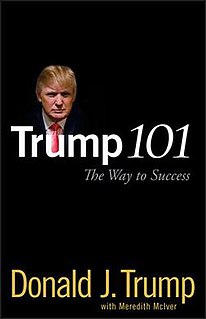 W
WTrump 101: The Way to Success is a book credited to Donald Trump and written by ghostwriter Meredith McIver. The first edition was published in hardcover format by Wiley in 2006. The book contains twenty-four chapters imparting advice on business acumen with quotations included from Trump. The authors caution the reader about the inherent risks seen in business deals, and advise individuals to promptly deal with conflicts. Trump recommends other books including The Art of War and The Power of Positive Thinking, as well as his company Trump University.
 W
WTrump Tower is a work of fiction by Jeffrey Robinson, originally credited to Donald Trump, and billed as Trump's "debut novel" by the publisher. It was first published in 2011 by Vanguard Press. Trump had previously attempted to create a television series titled Trump Tower, modeled after Dallas, Dynasty, and Upstairs, Downstairs. He worked with MVP Entertainment, contracted a writer in Los Angeles, and successfully had Showtime Networks develop a television pilot. After receiving a payment for television rights to Trump Tower, he marketed the idea to Lifetime. The book by this title was developed in 2011 listing Trump, but when released in 2012 credited Robinson as sole author.
 W
WTrump: Surviving at the Top is a 1990 book written by businessman Donald Trump and journalist Charles Leerhsen, and published by Random House. In 1991, Warner Books purchased the paperback rights to the book and re-released it as The Art of Survival.
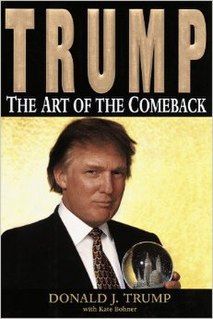 W
WTrump: The Art of the Comeback is a 1997 book written by businessman Donald Trump and journalist Kate Bohner.
 W
WTrump: The Art of the Deal is a 1987 book credited to Donald J. Trump and journalist Tony Schwartz. Part memoir and part business-advice book, it was the first book credited to Trump, and helped to make him a "household name". It reached number 1 on The New York Times Best Seller list, stayed there for 13 weeks, and altogether held a position on the list for 48 weeks. The book received additional attention during Trump's 2016 campaign for the presidency of the United States. Trump cited it as one of his proudest accomplishments and his second-favorite book after the Bible.
 W
WWhen Genius Failed: The Rise and Fall of Long-Term Capital Management is a book by Roger Lowenstein published by Random House on October 9, 2000. The book puts on an unauthorized account of the creation, early success, abrupt collapse, and rushed bailout of Long-Term Capital Management (LTCM). LTCM was a tightly-held American hedge fund founded in 1993 which commanded more than $100 billion in assets at its height, then collapsed abruptly in August/September 1998. Prompted by deep concerns about LTCM's thousands of derivative contracts, in order to avoid a panic by banks and investors worldwide, the Federal Reserve Bank of New York stepped in to organize a bailout with the various major banks at risk.
 W
WWhy We Want You to Be Rich: Two Men, One Message is a non-fiction book about personal finance, co-authored by Donald Trump and Robert Kiyosaki. The book was first published in hardcover format in 2006. The coauthors became familiar with each other through mutual work at The Learning Annex and Trump being impressed by Kiyosaki's writing success with Rich Dad Poor Dad. Trump and Kiyosaki co-authored another book together in 2011, Midas Touch: Why Some Entrepreneurs Get Rich-And Why Most Don't. The book discusses American economic problems including the middle-class squeeze, economic globalization, and the national debt of the United States. The authors advise the reader to gain financial literacy and delve into entrepreneurship. Trump and Kiyosaki criticize mutual funds and advocate real estate investing as a way to build wealth.
 W
WYou Only Live Once: The Roadmap to Financial Wellness and a Purposeful Life is a 2016 book written by Jason Vitug. The book sets to redefine the YOLO mantra that has been used to define Generation Y or millennials, to set a mindset shift to cultivate a healthy and wealthy lifestyle for a lifetime. The book focuses on a three step process called ACT, an acronym for awareness, creating a plan, and taking control steps, outlined by the author. The books aim is to make readers define the life they want to live before setting financial goals. You Only Live Once: The Roadmap to Financial Wellness and a Purposeful Life is written in a simple conversation tone based on Vitug's financial experiences and conversations with others
 W
WZero to One: Notes on Startups, or How to Build the Future is a 2014 book by the American entrepreneur and investor Peter Thiel co-written with Blake Masters. It is a condensed and updated version of a highly popular set of online notes taken by Masters for the CS183 class on startups, as taught by Thiel at Stanford University in Spring 2012.